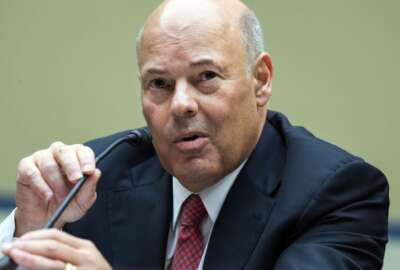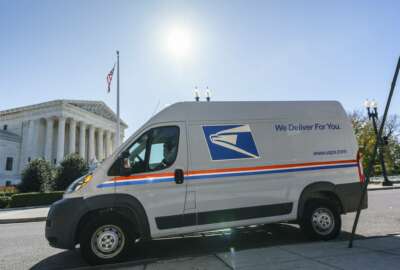

The Postal Service, faced with unacceptable delays delivering mail and packages, is “evaluating all service standards” as part of a 10-year business plan.
The Postal Service, faced with unacceptable delays delivering mail and packages, is “evaluating all service standards” as part of a 10-year business plan the agency expects to send to Congress next month, Postmaster General Louis DeJoy said Wednesday.
“Our plan sticks with the mission. It makes some adjustments to unachievable hurdles. It makes some adjustments for things that we are asked to do that are extremely costly,” DeJoy told the House Oversight and Reform Committee.
DeJoy told the committee that the Postal Service’s performance problems aren’t new, and that the agency hasn’t met service standards over the last eight-to-nine years, despite the agency spending considerable resources to meet its goals and “herculean efforts” from its workforce.
Pending approval for some added flexibility to its delivery standards, DeJoy said USPS is looking at shipping less mail and fewer packages through its air carriers, and would instead rely more heavily on ground transportation for delivery.
DeJoy said the agency’s network currently depends on a series of transportation contractors that drive up costs and have caused problems for the agency’s delivery schedule.
“That is a big, big reason for a lot of our failure, especially up through the Christmas holiday. We’ve had packages … held up at airmail facilities across the country. It is not reliable,” DeJoy said.
The agency’s upcoming 10-year reform plan, he said, amounts to “better operational management of what we’re doing,” and wouldn’t impact the agency’s obligation to deliver mail to nearly every U.S. household six days a week.
However, DeJoy told lawmakers USPS is looking at redefining the scope of where it will offer two-day local mail delivery.
“There will be a two-day mail class in our plan. Some percentage of that, where the reach is right now, may change,” DeJoy said.
Members of Congress, however, raised concerns about the strategy, saying it amounted to extending the window for delivery times to improve service metrics.
National security subcommittee chairman Stephen Lynch (D-Mass.) warned cuts to service standards would lead to a “downward spiral” for the agency.
“If the business plan for the post office is to deliver an inferior product — and we’re in competition with FedEx and UPS and Amazon — that spells trouble,” Lynch said.
USPS also faces criticism from its customers in the mailing industry. Given the agency’s recent performance metrics, mailers are concerned about an imminent price increase approved by the Postal Regulatory Commission.
Joel Quadracci, president and CEO of Quad/Graphics, said the deterioration of USPS service, combined with higher prices has “shaken the confidence of the industry in the postal system.”
USPS Inspector General Tammy Whitcomb said her office is reviewing cases where the Postal Service stopped accepting mail at certain “overwhelmed” facilities and is looking at the root cause of low rates of on-time delivery in areas including Atlanta, Charleston, South Carolina and Detroit.
Rep. Bob Gibbs (R-Ohio) told DeJoy he’s given up on paying bills through the mail after receiving statements with due dates that had already passed.
“I’ve lost all confidence in the postal system,” Gibbs said.
Members of the committee also released the draft text of a new postal reform bill that goes further than a similar bill that passed the House last year and that lawmakers reintroduced earlier this month.
DeJoy said USPS supports the bill, adding that it’s the agency’s only legislative request in its 10-year business plan.
“If you want a viable Postal Service and can trust that we have a plan to move forward, this is a good way to help,” DeJoy said about the bill.
The 2021 Postal Service Reform Act would require postal employees to enroll in Medicare when they turn 65. The bill wouldn’t require current retirees to enroll, but would give them a three-month grace period from late-enrollment penalties if they opt to do so.
The bill would also eliminate the Postal Service’s 2006 mandate to pre-fund retiree health benefits well into the future.
DeJoy said Medicare integration and ending the pre-funding mandate are necessary aspects of postal reform that would save USPS $40 billion to $50 billion over the next 10 years, but would only address a portion of the $160 billion in liabilities the agency expects to incur over the next decade.
Lawmakers, in a memo outlining the reform bill, warn that the Postal Service’s retiree health benefits fund will run out of funding by 2030.
American Postal Workers Union President Mark Dimondstein said the approximately $45 billion in the fund is invested entirely in low-growth Treasury bonds and is “far outpaced” by rising medical costs.
He said APWU would support the Medicare integration proposal, as long as Congress eliminates the pre-funding mandate and invests at least half of the USPS retiree health benefits fund in a portfolio of investments similar to the Thrift Savings Plan.
DeJoy said the legislation, combined with the USPS 10-year plan, would get the agency to a point where it would “break even” in a decade. USPS has ended the past 14 years with billion-dollar net losses.
The National Active and Retired Federal Employees Association (NARFE) supports the draft version of the reform bill. NARFE President Ken Thomas said in a statement that the bill, as written, would “provide much-needed financial relief” to USPS.
NARFE added that the current draft of the bill would preserve choice for current postal retirees regarding whether to enroll in Medicare Part B, without requiring it as a condition for receiving their earned retiree health benefits.
“After years of advocating for this exact change, NARFE is pleased to learn that the discussion draft maintains choice for current retirees,” Thomas said.
President Joe Biden, meanwhile, is putting his mark on Postal Service leadership. Biden intends to nominee three new members to join the USPS Board of Governors.
Those nominees are former deputy Postmaster General Ron Stroman, former American Postal Workers Union general counsel Anton Hajjar and Amber McReynolds, the CEO of the nonprofit Vote at Home.
If the Senate approves these picks, the board will have a Democratic majority.
DeJoy, however, told Rep. Jim Cooper (D-Tenn.) that he has no intention of stepping down, and expects to stay on the job “a long time” to see his reform plan through.
“Get used to me,” DeJoy told Cooper.
Copyright © 2024 Federal News Network. All rights reserved. This website is not intended for users located within the European Economic Area.
Jory Heckman is a reporter at Federal News Network covering U.S. Postal Service, IRS, big data and technology issues.
Follow @jheckmanWFED



